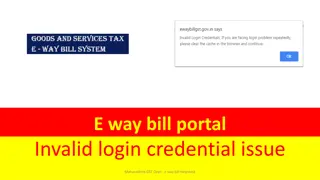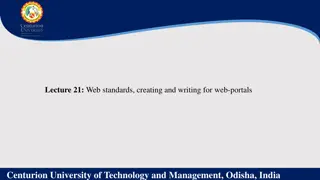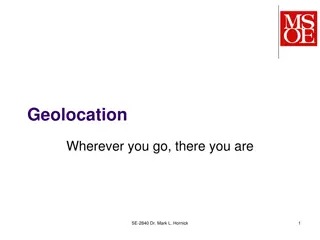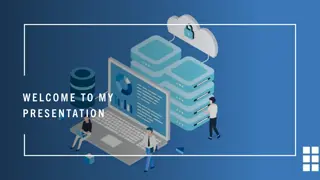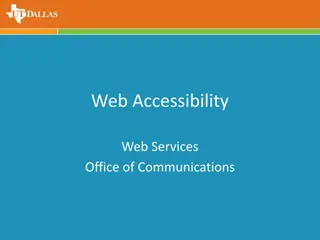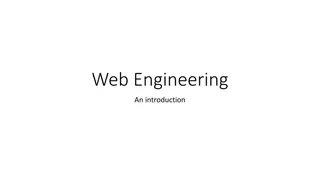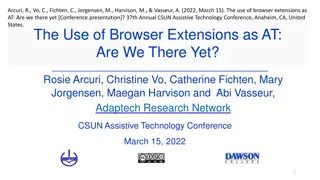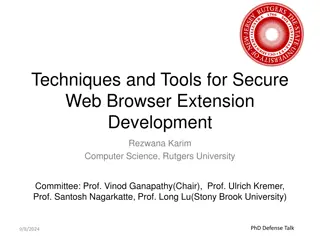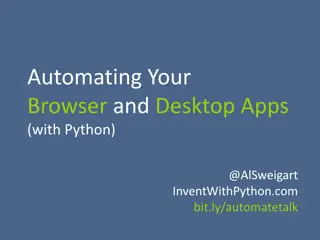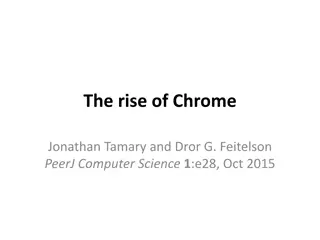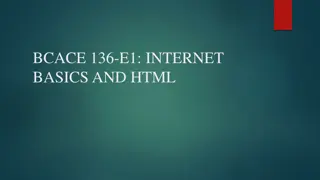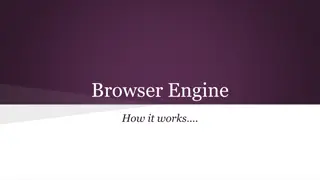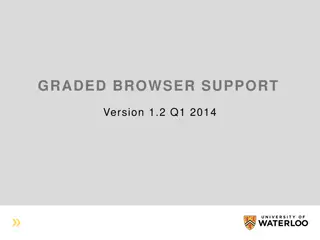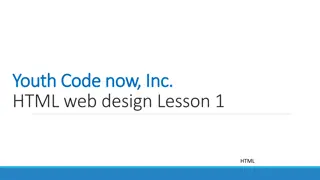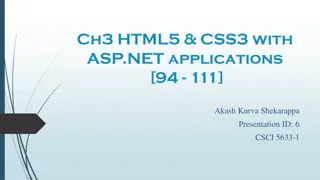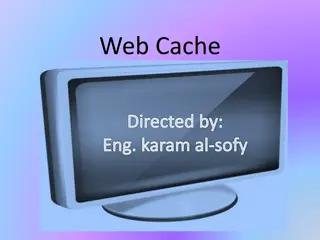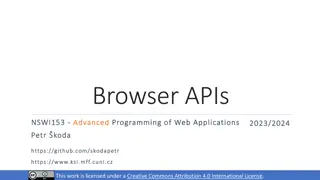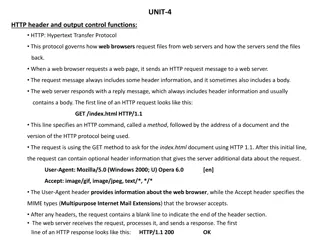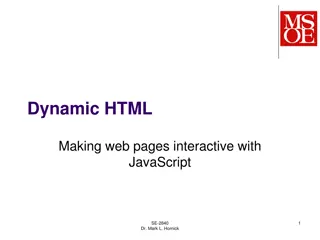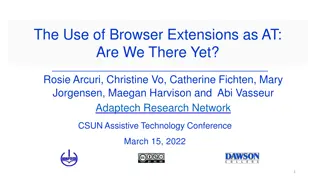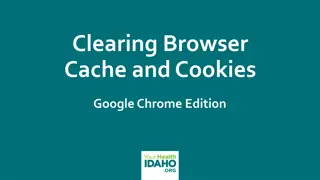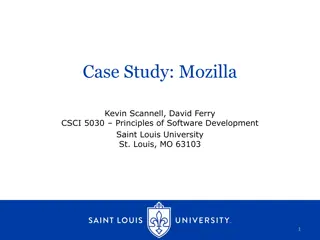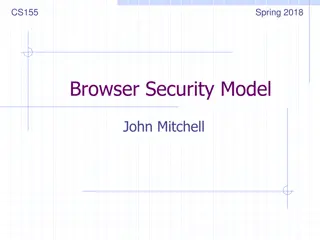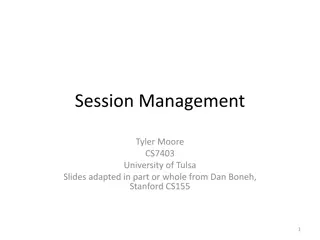Advanced Web Accessibility Tools Project Overview
The WAI-Tools Project under Horizon 2020 aims to enhance web accessibility assessments with advanced decision support tools. Key elements include introducing progress on Accessibility Conformance Testing (ACT) Rules, updates to national observatories, WCAG-EM Report Tool, and large-scale accessibili
2 views • 15 slides
Troubleshooting Invalid Login Credential Issue on e-Way Bill Portal
Some users are encountering an "Invalid Login Credentials" error while trying to access the Maharashtra GST Department's e-Way Bill Helpdesk portal at ewaybillgst.gov.in. To resolve this issue, it is recommended to clear browser cache and cookies. Additionally, ensure you are using a recommended bro
0 views • 13 slides
Exploring Blazor: An Experimental .NET Framework for the Browser
Blazor is an experimental .NET framework that enables C# and Razor developers to build web applications that run directly in the browser. Utilizing WebAssembly for client-side execution, Blazor provides a unique approach to web development, allowing for seamless integration of C# code with the brows
0 views • 39 slides
Enhancing Web Presence for Agricultural Portals
Adhering to web standards is crucial in creating agriculture content for the web to ensure compatibility, accessibility, and usability. Utilize HTML for structuring, CSS for presentation, and ensure responsive design for various devices. Follow guidelines for accessibility, optimize performance, tes
0 views • 6 slides
Understanding Geolocation: What You Need to Know
Geolocation is a built-in browser functionality that allows web applications to be location-aware. It uses geographic latitude/longitude and is supported by all modern browsers, making it an integral part of the HTML5/W3C JavaScript API. With geolocation, you can show users their position on a map,
0 views • 16 slides
Understanding Internet Basics and Web Browsers
This content covers the basics of the Internet and World Wide Web, including the differences between the two, the functions of web browsers, components of Internet Explorer, parts of the World Wide Web, conducting effective Internet searches, understanding search results, evaluating websites, and di
0 views • 49 slides
Understanding Web Hosting and Server Types
Web hosting is a service that enables individuals and organizations to make their websites accessible via the World Wide Web. It provides necessary infrastructure, storage, and connectivity to ensure websites are available to users 24/7. The web hosting process involves domain names, DNS translation
0 views • 9 slides
Understanding Web Accessibility and Its Importance
Web accessibility ensures that websites are designed to be inclusive and accessible to all users, regardless of their abilities. By removing barriers, web accessibility allows equal access to information and functionality, benefiting not only users but also businesses. Accessibility is vital in vari
0 views • 10 slides
Exploring the Fundamentals of Web Engineering
Delve into the world of web engineering with an introduction to its motivation, basic paradigms, conceptual architecture, history, protocol stack, the role of the World Wide Web Consortium (W3C), and the nature of web applications. Understand the categories of web applications and how they provide s
0 views • 51 slides
Browser Extensions as Assistive Technology: Enhancing Accessibility
Explore the potential of browser extensions as assistive technology in a presentation from the 37th Annual CSUN Assistive Technology Conference. Learn how Chrome extensions can support students with disabilities, providing safe downloads, alternative AT options, and unique functions, all while enhan
0 views • 32 slides
Techniques and Tools for Secure Web Browser Extension Development
Explore the world of web browser extensions with Rezwana Karim's research at Rutgers University, focusing on secure development techniques, extensible platforms, and the implications of vulnerable extensions on platform security. Discover the popularity and impact of browser extensions in today's di
1 views • 66 slides
Exploring Secure Cooperative Sharing of Resources in Web Applications
This series of visual representations delves into the concept of secure cooperative sharing of JavaScript, browser capabilities, and physical resources in web applications. The images and descriptions cover topics such as web application security, browser functionality, and the principles of sharing
0 views • 22 slides
Automating Your Browser and Desktop Apps Using Python
Explore the world of automation with Python programming language through Al Sweigart's book "Automate the Boring Stuff". Learn web scraping techniques and use Selenium to automate tasks on your browser and desktop applications effortlessly.
0 views • 30 slides
The Rise of Chrome: A Technical Comparison with Competing Browsers
Since 2009, Google Chrome has become the dominant desktop browser, outpacing competitors like Internet Explorer and Firefox. This study delves into the technical aspects that have contributed to Chrome's rise, including performance benchmarks, features, and adherence to industry standards. The metho
0 views • 40 slides
Browser News and Root Inclusion Process Updates
The Browser news reveals new policies and strategies to enhance user experience, including the clarification of inclusion processes and removal of certain roots. Additionally, updates on the Root inclusion process for CAs are mentioned, with scheduled quarterly updates starting in October 2018. Sugg
0 views • 6 slides
Understanding Web Browsers and Internet Explorer
Web browsers are essential software applications that allow users to navigate the internet by interpreting HTML files, handling multimedia content, managing history, and more. Learn about the features of web browsers, their support for web standards like HTML and JavaScript, and how to open Internet
0 views • 17 slides
Understanding How Browser Engines Work
Browser engines play a crucial role in how web browsers retrieve, present, and traverse information resources on the World Wide Web. This process involves fetching a page, interpreting URLs, rendering content with layout engines, and utilizing components like the host application. Popular layout eng
0 views • 10 slides
Understanding Silverlight for Web Hosting Companies
Silverlight is a versatile web technology that provides cross-browser and cross-platform capabilities for creating rich internet applications. It allows for XML-based graphics, animation, audio, video, and event handling, scripted with JavaScript. Integration with web servers via AJAX design pattern
0 views • 16 slides
University of Waterloo Browser Support Guidelines
The University of Waterloo has introduced a graded browser support system, emphasizing that support does not mean identical experiences for all users. The purpose is to ensure accessibility and prioritize content consumption based on browser capabilities. The guidelines introduce grades of support a
0 views • 21 slides
Understanding How Websites Work with HTML
HTML is the standard markup language for creating web pages. When you surf the web, your browser makes requests to web servers, which then provide responses back to display the web pages. This process allows you to access information instantly from web servers located across the globe.
0 views • 17 slides
CSS Rule Sets and Cross-Browser Compatibility in ASP.NET Applications
Learn how to code CSS rule sets and ensure cross-browser compatibility in ASP.NET applications. Explore Visual Studio features for working with HTML and CSS, along with guidelines for testing web pages on different browsers and utilizing HTML5 features effectively.
0 views • 20 slides
Web Security Essentials
Discover the importance of web security, reported vulnerabilities, web versus system vulnerabilities, browser security model, HTTPS protocol, familiar web technologies, goals of web security, HTTP basics, and more to safeguard your online activities and applications effectively.
0 views • 60 slides
Introduction to BED Files: An Overview of Browser Extensible Data Format
BED (Browser Extensible Data) files are commonly used for annotating genomic sequences by specifying ranges on chromosomes. They consist of required fields like chromosome name, start and end positions, and optional fields for additional information such as name, score, strand, and color representat
0 views • 11 slides
Understanding Web Caching: An Overview
Web caching, implemented through various types of caches like browser cache, proxy cache, and gateway cache, plays a crucial role in improving content availability, reducing network congestion, and enhancing user experience by saving bandwidth and decreasing latency. It addresses the challenges pose
0 views • 27 slides
Advanced Programming of Web Applications with Browser APIs
Explore advanced programming techniques for web applications using Browser APIs like navigation, history, web pages visibility, multiple windows/tabs, mouse and pointer interaction, and text selection. Learn how to leverage these APIs to create dynamic and interactive web experiences.
0 views • 22 slides
Overview of HTTP Protocol and Output Control Functions
The Hypertext Transfer Protocol (HTTP) governs how web browsers request files from servers and receive responses. When a browser requests a web page, it sends an HTTP request message to the server, which includes headers and optional body content. The server responds with a message containing header
1 views • 8 slides
Understanding Sessions and Cookies in Web Development
Sessions and cookies play a vital role in web development. Sessions represent a series of HTTP requests between a web browser and server, while cookies store data on the client side. PHP allows for managing sessions and cookies effectively, including setting, expiring, and deleting them. Sessions ar
0 views • 12 slides
Understanding JavaScript Core API and Browser Object Model (BOM)
Explore the fundamentals of JavaScript Core API and the Browser Object Model (BOM) in this informative content. Learn about native objects, host environment elements, global objects like window, BOM hierarchy, object extension in JavaScript, and essential window methods and attributes for interactiv
0 views • 27 slides
Exploring the Use of Browser Extensions for Assistive Technology
The presentation discusses the use of browser extensions as alternative assistive technology for students with disabilities who may prefer not to use traditional AT tools. It covers topics such as the benefits of Chrome extensions, safety tips for downloading and using them, and a curated list of re
0 views • 32 slides
Clearing Browser Cache and Cookies: Google Chrome Edition
In this guide, you will learn how to clear the browser cache and cookies in Google Chrome. Follow the easy steps to ensure smooth browsing experience. From accessing your browser settings to selecting the right options, this tutorial covers it all. Keep your browser running efficiently by regularly
0 views • 6 slides
Mastering Internet Research for Managers: Browser Tools and Search Techniques
Enhance your managerial skills by delving into Internet research techniques, focusing on web browser basics, search strategies, and browser tools. Learn about popular browsers like Google Chrome, Mozilla Firefox, Apple Safari, and Microsoft Edge, along with tips for efficient web searching using Chr
0 views • 13 slides
An Empirical Evaluation of Security Indicators in Mobile Web Browsers
Security indicators play a crucial role in determining the security of web pages on mobile browsers. This study evaluates the effectiveness of security indicators in identifying potential threats such as phishing and man-in-the-middle attacks. The research examines W3C guidelines, mobile browser com
0 views • 25 slides
Evolution of Mozilla: From Browser Wars to Open-Source Development
The evolution of Mozilla from the Browser Wars era to becoming a pioneer in open-source community development is highlighted. Starting with Mosaic and Netscape Navigator, Mozilla transformed into the popular Firefox browser and expanded into various projects under the Mozilla Foundation and Corporat
0 views • 22 slides
Basic Web Security Model for Secure Electronic Commerce
This presentation covers the basic web security model for secure electronic commerce, focusing on vulnerabilities such as XSS and SQL injection. It discusses the decline in web vulnerabilities since 2009 and explores reported web vulnerabilities. The course theme includes topics like web application
0 views • 38 slides
Secure Exam Monitoring with LockDown Browser and Respondus Monitor
Enhance exam security with the combination of LockDown Browser and Respondus Monitor. Students must download and install LockDown Browser, ensuring webcam usage for monitoring. The process involves launching the desktop app, confirming technology requirements, and accessing various resources for a s
0 views • 7 slides
Understanding Web Security: Threats and Protections
Exploring the landscape of web security through discussions on historical vulnerabilities, top web threats, browser security models, and the goals of web security. Delve into the world of web programming, security threat models, and learn about the goals and importance of maintaining a secure web br
0 views • 74 slides
Understanding Web Caching, Proxies, and CDNs in Web Architecture
This comprehensive guide delves into the concepts of web caching, proxies, and CDNs, explaining their importance in web architecture. It covers topics such as caching mechanisms, browser cache management, what can be cached, and controlling caches with HTTP headers. The provided images visually illu
1 views • 42 slides
Understanding Session Management Challenges in Web Applications
Session management is crucial in web applications to maintain user authentication and authorization. This presentation delves into the evolution of session management, highlighting issues with HTTP authentication, the use of session tokens, and challenges in storing and securing session data. Variou
0 views • 18 slides
Ultimate Guide to Own Web Now's Web Hosting Platform
Dive into Own Web Now's web hosting platform through this comprehensive startup guide, which covers the process of ordering website hosting, deployment, management, and publishing website content. Learn about the Linux/PHP and Windows ASP.NET hosting options, how to configure your hosting account, m
0 views • 7 slides
Exploring Privacy on the Web: Understanding the Deep and Dark Web
Delve into the intricate world of internet privacy, from the surface web to the hidden realms of the deep and dark web. Discover the importance of safeguarding personal data online, the significance of the Deep Web's unindexed content, and the intricacies of the Dark Web accessible via specific soft
0 views • 25 slides

